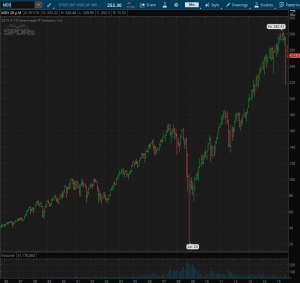What are Mid-Cap Stocks?
The mid-cap equity space, typically defined as companies with market capitalizations between $2 billion and $10 billion, have characteristics of both large and small cap stocks. They enjoy higher growth rates than large cap stocks but also offer higher dividend yields than small caps. They also have more global reach than small-cap stocks, who primarily service domestic markets. Consider using an inverse mid-cap ETF as a hedge.
What’s the Concern for Mid-Cap Stocks?
Mid Cap stocks have enjoyed a tremendous run since the financial crisis in 2009. The Mid-cap ETF, MDY, rebounded almost 400% from the March 2009 lows to the June 2015 highs. Except for the transportation index, it’s had the largest run of any major index since the crisis. Mid-caps enjoy a decent dividend yield (in this environment) without sacrificing much in terms of growth rates. But with the current bull market getting a bit extended, today’s mid cap index is made up of former small-cap stocks and could sell-off hard in a bear market. According to Lori Calvasina, strategist at Credit Suisse, mid caps have “the worst valuation story in the U.S. equity market at this moment.” She notes that mid caps sport a price 18 times Price to Earnings ratio (PE) while large caps trade near 16 times and small caps at 17 times. “We are very, very worried about the mid-cap space at the moment”, she warns.*
Hedging with an Inverse Mid-Cap ETF
There are a few inverse mid-cap ETFs but they aren’t very popular as a hedging tool. The largest is the ‘Short MidCap 400’ (MYY) from ProShares with about $24 million in assets under management and almost 40,000 shares trading on a 3-month basis. ProShares also offers 2x and 3x inverse ETFs for the midcaps. Direxion offers it’s own triple leveraged inverse ETF, the ‘Daily MidCap Bear 3X shares (MIDZ) with a little over $10 million in assets under management. None of these mid-cap inverse ETFs seem to be very popular with investors as a hedging tool. We think they will be.
Inverse ETFs mentioned:
- MYY
- MIDZ
http://www.cnbc.com/2014/10/03/heres-why-you-should-worry-about-mid-cap-stocks.html

